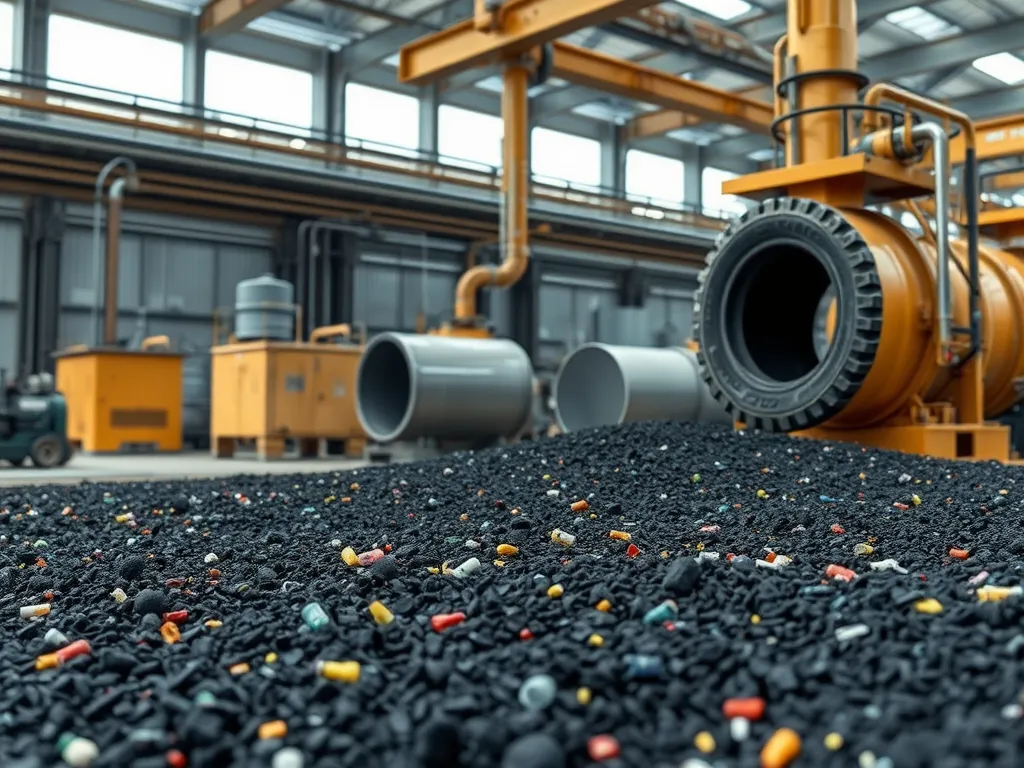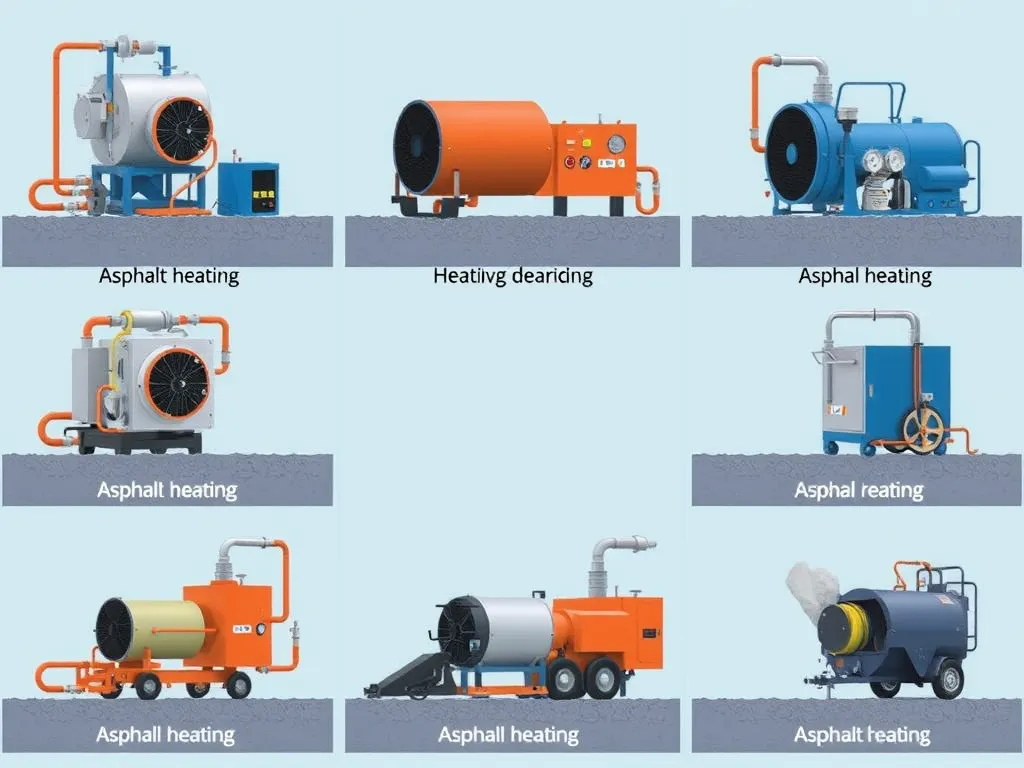Eco-friendly Asphalt Additives: A Sustainable Solution for Modern Pavement
Published on: November 23, 2025 | Last Updated: April 14, 2025
Written By: George Voss
Eco-friendly asphalt additives are materials added to asphalt mixes to reduce environmental harm while improving road quality. These additives replace petroleum-based components with recycled plastics, rubber tires, bio-oils, or industrial byproducts. They maintain pavement strength but cut energy use, emissions, and raw material consumption. For example, Warm Mix Asphalt (WMA) additives lower production temperatures from 300°F to 250°F, reducing fuel costs by 20%. Other types like Reclaimed Asphalt Pavement (RAP) reuse up to 40% old pavement materials. Benefits include fewer greenhouse gases, longer road life (15-20 years vs. 10-12 years traditional), and 35% less landfill waste.
This article breaks down how eco-friendly asphalt additives work and why they matter. Explore WMA’s role in cutting CO2 emissions at plants. Compare rubber-modified asphalt’s noise reduction (3-5 decibels) against standard mixes. Learn how RAP can save $8-$15 per ton in material costs. We’ll also cover bio-based binders from soy or algae, government tax credits for sustainable projects, and tips to balance upfront costs with long-term savings.
Contents
- Understanding Eco-friendly Asphalt Additives
- Key Benefits Of Eco-friendly Asphalt Additives
- Types Of Sustainable Asphalt Additives
- Implementing Eco-friendly Asphalt Additives
- Cost Analysis Of Eco-friendly Asphalt Additives
- Environmental Impact Of Eco-friendly Asphalt Additives
- FAQs About Eco-friendly Asphalt Additives
- Closing Thoughts
- Additional Resources for You:
Understanding Eco-friendly Asphalt Additives
Eco-friendly asphalt additives boost pavement quality while cutting harm to Earth. These products help roads last longer with less strain on nature. They work in hot mix, cold mix, and recycled asphalt projects.
What Are Eco-friendly Asphalt Additives?
These additives mix into asphalt to make it greener. They come from reused, plant-based, or low-pollute sources. Examples include rubber from old tires, oils from plants, and warm mix agents.
Definition and Purpose in Asphalt Production
Eco asphalt additives replace harsh chemicals in road builds. Their main goal: cut fuel use, lower fumes, and reuse waste. For example, bio-based binders swap out 15-20% of petroleum bitumen with renewable oils.
How Do Eco-friendly Asphalt Additives Work?
These additives tweak how asphalt acts during mixing, laying, and use. Warm mix tech drops production heat by 50°F, slashing fuel costs 20%. Rubber crumbs from tires absorb road noise 30% better than standard mixes.
Mechanisms for Reducing Environmental Impact
Three key methods drive eco gains. First, lower heat needs mean less CO₂—a 275-ton job can save 80 gallons of diesel. Second, recycled stuff like RAP (Reclaimed Asphalt Pavement) cuts mining by 30%. Third, plant-based additives break down faster, leaving smaller eco marks.
Ready to see how these green tweaks boost road life and budgets? Let’s break down the top perks next.
Key Benefits Of Eco-friendly Asphalt Additives
Eco-friendly asphalt additives transform pavement projects by merging sustainability with high performance. These solutions tackle environmental challenges while meeting modern infrastructure demands.
Enhanced Asphalt Performance and Durability
Bio-based asphalt additives like rubberized binders or bioboosters strengthen pavement structures. Recycled tire rubber boosts crack resistance by 40%, while bioboosters derived from plant oils improve binder flexibility. This extends pavement lifecycles by 15-20 years, slashing maintenance costs. Warm mix asphalt (WMA) additives reduce mix temperatures by 50°F, preventing premature aging and improving compaction. Pavements stay resilient against rutting, freeze-thaw cycles, and heavy truck loads exceeding 18,000 lbs per axle.
Reduction in Harmful Emissions and Pollutants
WMA additives cut production temperatures, lowering CO₂ emissions by 30% compared to traditional hot mix asphalt. A single plant using WMA tech reduces annual greenhouse gas output by 1,200 metric tons—equal to 260 cars taken off roads. Bio-based additives replace petroleum-based binders, slashing volatile organic compounds (VOCs) by up to 65%. Projects using recycled rubber report 50% less particulate matter during mixing, improving air quality for workers and nearby communities.
Resource Efficiency and Waste Reduction
Reclaimed asphalt pavement (RAP) integration with green asphalt additives diverts 95% of old pavement from landfills. Mixes with 30% RAP and bioboosters maintain structural integrity while saving 3 tons of virgin aggregate per 100 sq. ft. Recycled tire additives repurpose 12 million scrap tires annually in U.S. road projects. Waste plastics like PET bottles, when processed into polymer-modified binders, reduce petroleum demand by 20% per ton of asphalt. This closed-loop approach preserves natural resources without sacrificing pavement strength.
With these benefits established, let’s examine the types of sustainable additives shaping today’s asphalt industry.

Types Of Sustainable Asphalt Additives
Modern paving relies on advanced materials to balance performance with environmental responsibility. Let’s explore the most effective eco-friendly asphalt additives reshaping the industry.
Warm Mix Asphalt (WMA) Additives
WMA additives like Evotherm® or Sasobit® allow asphalt production at 250–275°F instead of traditional 300–330°F. This cuts energy use by 20–35% and slashes CO2 emissions by 30% per ton.
Lower Production Temperatures, Lower Emissions
- Reduces fumes: Workers face 50% fewer harmful vapors
- Extends paving season: Cold-weather application down to 40°F
- Saves $1.50–$3.00 per ton in fuel costs
Reclaimed Asphalt Pavement (RAP) Integration
RAP mixes 30–50% recycled asphalt into new pavements. Combined with rejuvenators like BioSpan™, it restores aged binders while saving $8–$15 per ton. Over 90 million tons of RAP get reused annually in the US.
Bio-based Additives and Bioboosters
Derived from plants, these additives replace petroleum-based binders. BioSphere’s BioMAG® uses soybean oil to enhance flexibility and reduce cracking by 15% in freeze-thaw zones.
Renewable Materials in Asphalt Binders
- Lignin from timber waste: Boosts stiffness by 40%
- Pine resin derivatives: Improve moisture resistance
- Algae-based binders: Emerging tech with 80% lower carbon output
Recycled Rubber and Tire-derived Additives
Crumb rubber from 12 million recycled tires annually gets blended into asphalt. This “asphalt-rubber” mix lasts 30% longer than standard pavements while reducing road noise by 5 decibels. States like Arizona and Florida use it on 25% of highways.
With these additives proven in real-world applications, the focus shifts to matching them with project needs. Next, we’ll examine how to select the right solution based on climate, traffic, and budget.
Also See: Asphalt Maintenance Tips for a Lasting Driveway
Implementing Eco-friendly Asphalt Additives
Switching to sustainable asphalt additives requires strategic planning. Success depends on selecting materials aligned with project demands and following precise application protocols.
How to Choose the Right Additive for Your Project
Not all eco-friendly asphalt additives work for every scenario. Prioritize performance requirements and environmental goals when evaluating options like bio-based binders or recycled rubber modifiers.
Factors: Climate, Traffic Load, and Project Scale
- Climate: Use PG (Performance Grade) binders modified with additives like Evotherm® for cold regions to prevent cracking. Opt for UV-resistant additives in high-heat zones to slow oxidation.
- Traffic Load: High-traffic highways need polymer-modified additives (e.g., styrene-butadiene-styrene) to handle over 10,000 ESALs (Equivalent Single Axle Loads). Residential driveways perform well with 15-20% RAP (Reclaimed Asphalt Pavement).
- Project Scale: Large-scale projects benefit from WMA (Warm Mix Asphalt) additives, cutting production temps by 30-50°F. Small jobs may use soybean-based rejuvenators for cost-effective recycling.
Steps to Transition From Traditional to Sustainable Asphalt
Shifting to green asphalt additives involves phased adjustments. Follow these steps to minimize disruptions:
- Audit Existing Materials: Test current asphalt mixes for compatibility with additives like tire-derived crumb rubber or bio-oils.
- Run Pilot Tests: Apply the eco-friendly asphalt mix to a 500–1,000 sq ft area. Monitor compaction rates and curing times.
- Adjust Mix Designs: Reduce virgin bitumen by 5-7% when using RAP or RAS (Recycled Asphalt Shingles). Increase binder grade by one level for polymer-enhanced blends.
- Train Crews: Educate teams on handling temperature-sensitive WMA additives or bio-based compounds requiring storage below 140°F.
- Track Performance: Use infrared imaging to detect early-stage raveling or rutting in pavements with recycled content.
Upfront investments in eco-friendly asphalt products often lead to long-term savings. Let’s break down the numbers.

Cost Analysis Of Eco-friendly Asphalt Additives
Balancing budgets while prioritizing sustainability requires a clear view of costs tied to green asphalt additives. Let’s break down what matters for builders, contractors, and city planners.
Initial Costs Vs. Long-term Savings
New sustainable asphalt additives often carry a 15-30% higher upfront price compared to traditional materials. Bio-based asphalt additives like soybean-oil modifiers or recycled tire rubber cost $1.50-$3.50 per ton of mix. Warm Mix Asphalt (WMA) technologies add $2-$6 per ton due to specialized waxes or surfactants. But these numbers don’t tell the full story.
Projects using Reclaimed Asphalt Pavement (RAP) save up to 25% on material costs by reusing existing asphalt. Lower production temps with WMA cut fuel bills by 20-35%, saving $8-$15 per ton. Longer-lasting pavements—some with 30% fewer cracks over 10 years—mean fewer repairs. A 2023 study found roads built with sustainable asphalt additives saved $42,000 per mile in maintenance within five years.
Government Incentives for Sustainable Asphalt Projects
Federal and state programs lower financial barriers for adopting asphalt additives eco-friendly solutions. The U.S. DOT’s FHWA offers grants covering 50-80% of incremental costs for RAP or WMA projects. Tax credits like the Alternative Fuel Mixture Excise Tax provide $0.24 per gallon for bio-binders derived from plants.
| Program | Benefit | Eligible Additives |
|---|---|---|
| EPA’s RPM Program | $12K-$25K per project | Recycled rubber, RAP |
| State DOT Rebates | Up to $8K per lane-mile | WMA, bio-boosters |
| Local Green Initiatives | Permit fee waivers | Biodegradable asphalt additives |
California’s Caltrans gives $5-$8 per ton for mixes with 25%+ RAP. Cities like Austin and Denver fast-track permits for projects using asphalt eco-friendly additives, cutting timelines by 2-4 weeks.
With savings stacking up over time and policy shifts favoring green asphalt additives, sustainable mixes are becoming the norm. Next, let’s quantify how these choices impact air quality, resource use, and waste streams.
Environmental Impact Of Eco-friendly Asphalt Additives
Eco-friendly asphalt additives directly tackle environmental challenges tied to traditional pavement production. These innovations reduce resource depletion, emissions, and waste while maintaining road quality.
Reduction in Carbon Footprint
Warm Mix Asphalt (WMA) additives slash production temperatures by 30–120°F compared to hot mix asphalt. Lower heat cuts fuel use by 20–35%, shrinking CO2 emissions by 1.5–2.5 tons per 1,000 tons of asphalt. Bio-based additives like lignin or vegetable oils replace 15–30% of petroleum-based bitumen, reducing greenhouse gas (GHG) emissions by up to 40% in binder production. A 2021 study found roads using sustainable asphalt additives lowered lifecycle carbon footprints by 18–22% over 20 years.
Minimizing Landfill Waste Through Recycling
Reclaimed Asphalt Pavement (RAP) reuse rates now hit 40–50% in mixes thanks to rejuvenators like bio-oils or polymer modifiers. Every ton of RAP repurposed keeps 1.4 tons of debris from landfills. Recycled tire rubber additives divert 12 million scrap tires annually in the U.S. alone. High-RAP mixes with eco-friendly binders reduce virgin aggregate demand by 35%, preserving natural reserves. States like California mandate 15–30% recycled content in public road projects to accelerate circular economy practices.
With clear environmental gains, many contractors now ask: How do these additives perform under heavy traffic or extreme weather? Let’s examine real-world applications.

FAQs About Eco-friendly Asphalt Additives
What is Environmentally Friendly Asphalt?
Environmentally friendly asphalt refers to asphalt mixtures that incorporate sustainable additives, reducing environmental impacts during production and use. This can include using recycled materials, bio-based additives, and processes that lower emissions and energy consumption.
How Can I Make My Driveway Eco-friendly?
To make your driveway eco-friendly, consider using asphalt mixed with recycled materials such as Reclaimed Asphalt Pavement (RAP) or bio-based additives. You can also look for Warm Mix Asphalt (WMA) options to reduce energy use during installation and enhance performance.
What is the Most Environmentally Friendly Paving Method?
The most environmentally friendly paving method involves using recycled materials, such as RAP and tire-derived additives, paired with sustainable practices like Warm Mix Asphalt technology. These methods minimize emissions and resource consumption while providing durable pavement.
How to Make Asphalt More Sustainable?
Making asphalt more sustainable can be achieved by incorporating eco-friendly additives, reducing production temperatures through Warm Mix Asphalt technology, and recycling old pavement materials. Engaging in proper maintenance also prolongs the lifespan of the pavement, making it more sustainable over time.
Closing Thoughts
Eco-friendly asphalt additives represent a pivotal shift in the paving industry, promoting sustainability without compromising performance. From Warm Mix Asphalt (WMA) additives to the integration of reclaimed materials and bio-based products, these innovations enhance durability, reduce emissions, and minimize waste.
Choosing the right additive depends on various factors including climate and traffic load, making careful consideration essential for every project. The transition to these sustainable solutions not only lessens environmental impact but also leads to long-term financial savings.
For more information on eco-friendly asphalt additives and other asphalt-related insights, check out Asphalt Calculator USA.
Additional Resources for You:
- Evaluation of eco-friendly asphalt mixtures incorporating waste plastic aggregates and additives: Magnesium, fly ash, and steel slag – ScienceDirect
- Asphalt Odor Control Solutions | Ecosorb
- Materials | Recycled Asphalt Eco-Friendly | Staker Parson
- Sustainable Solutions: Eco-Friendly Approaches to Asphalt Paving


